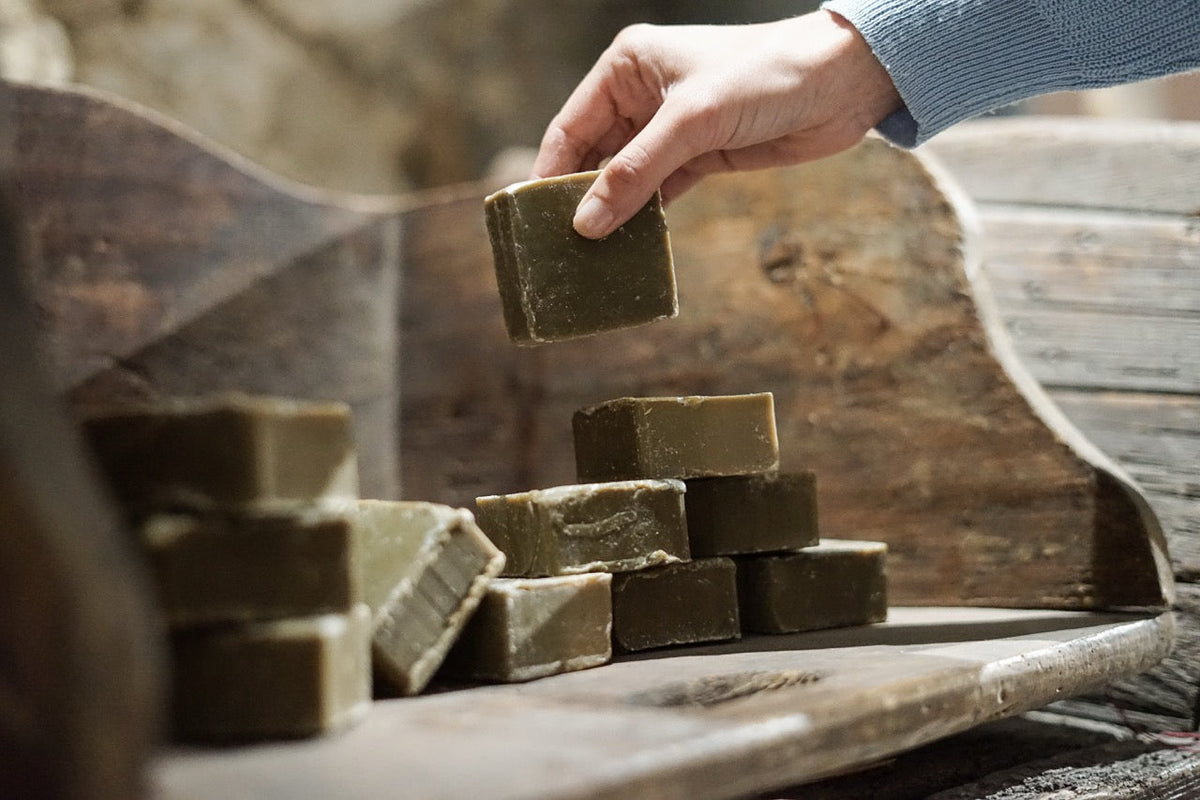

Gifting couldn't be easier
Add a gift message to be emailed to when their parcel arrives, or at a time of your choice.
When we talk about planet-friendly living, most of us think about being plastic-free, recycling, or cutting waste. And while reducing plastic and so on is a huge step toward protecting our planet, the bigger picture is much more complex. It’s not only about what our products are packaged in, the less talked about side to sustainability is the ingredients inside the products we use every day.
From synthetic ingredients to harsh preservatives, most readily available everyday soaps, shampoos, and cleaners are packed with synthetic ingredients that, while effective, can leave a heavy environmental footprint. Let’s take a closer look at what “planet friendly living” really means and explore cleaner, greener alternatives products to help further reduce our environmental impact.
Most readily available soaps, shampoos and household cleaners are made using synthetic ingredients such as:
Sulfates (SLS, SLES): These create the foamy lather people associate with “clean,” but they’re petroleum-derived and can be toxic to aquatic life once rinsed down the drain.
Parabens and Preservatives (EDTs): Designed to extend shelf life, parabens are endocrine disruptors and persist in the environment.
Artificial Fragrances & Colours: Often derived from petrochemicals, they may contain phthalates and non-biodegradable compounds.
While they may be cheap to produce, the true cost lies in water pollution, soil contamination, and the harm caused to marine ecosystems. Once flushed away, these ingredients don’t simply disappear—they linger.
It’s not just the end-use of these chemicals that causes harm; it’s how they’re made.
Synthetic chemicals are typically derived from petroleum, requiring drilling, refining, and chemical processing—all high-energy, carbon-intensive practices.
Waste streams from industrial chemical production often carry toxic by-products.
Transportation impact is higher for synthetics, since they’re produced in centralised factories and shipped globally.
In contrast, traditional natural ingredients like olive oil, laurel oil, coconut oil, and shea butter are often produced closer to where they are used, especially in artisanal soap-making regions like Provence. From renewable and sustainable resources, they are harvested annually and turned into soap using minimal production and with far less environmental strain.
This isn’t a simple black-and-white debate. Not every “natural” ingredient is automatically sustainable, and not every synthetic is entirely bad. But here are some key differences:
Natural Oils (Olive, Coconut, Shea, Sunflower): Renewable, biodegradable, and often locally sourced in soap-making traditions. Their farming can also support rural communities.
Essential Oils: Beautifully natural but must be used carefully; overharvesting (for example, sandalwood or rosewood) can lead to environmental stress. Sustainable sourcing matters.
Synthetics: Usually cheaper and more consistent, but often non-biodegradable and energy-intensive to produce.
Savon de Marseille is a perfect example of natural sustainability—made from 100% vegetable oils, biodegradable, and lasting far longer than bottled liquid soaps.
When choosing soap and skincare, it’s worth looking out for ingredients with a particularly negative footprint:
Why they’re used: To create that satisfying foam and deep-clean feeling.
Problem: Although biodegradable, sulfates can be irritating to skin and, in high concentrations, damage aquatic ecosystems. Plus, they’re often derived from petrochemicals or unsustainable palm oil.
Alternative: Gentle, plant-based surfactants like coconut-derived glucosides or simply traditional olive oil soap.
Why they’re used: Long-lasting preservatives in soaps, shampoos, and cosmetics.
Problem: Parabens can act as endocrine disruptors, affecting hormones in wildlife and showing up in rivers, seawater, and even marine animals.
Alternative: Shorter-shelf-life products made with rosemary extract, grapefruit seed extract, or natural blends of essential oils.
Why it’s used: To keep formulas stable and prevent discolouration by binding to metals in water.
Problem: Persistent and non-biodegradable. It carries heavy metals into rivers and bioaccumulates in the environment.
Alternative: Sodium phytate (from rice bran) — a natural chelator that’s biodegradable and eco-friendly.
Why they’re used: As fragrances, solvents, or mild preservatives.
Problem: Some, like benzyl alcohol, are safe and biodegradable. Others, like benzyl salicylate, are moderately toxic to aquatic organisms and can contribute to fragrance pollution.
Alternative: Essential oils for scent, or fragrance-free options for those with allergies.
Why it’s used: A synthetic preservative that prevents mould and bacteria.
Problem: Toxic to fish and aquatic life, doesn’t fully break down in waterways, and can build up in the environment.
Alternative: Plant-based preservatives like potassium sorbate, sodium benzoate, or even natural antioxidants such as vitamin E.
Why they’re used: added to body scrubs, face washes, and even toothpaste for exfoliation or shine.
Problem: Microplastics do not biodegrade, they wash straight into rivers and seas, where they are eaten by fish and shellfish, entering the food chain. They are found everywhere from Arctic ice to drinking water.
Alternative: Ground olive stones, apricot kernels, crushed dried plant flowers & leaves, can all be added to soap bars for gentle natural exfoliation and prevent these becoming waste products. Natural Loofah and sponges are also a fast growing and sustainable choice.
Why they’re used: Widely used in detergents and household cleaners to “soften” water and boost cleaning power.
Problem: When released into waterways, phosphates act as fertiliser, causing algal blooms. These blooms deplete oxygen, suffocate fish, and devastate aquatic ecosystems — a process known as eutrophication. Many regions (EU, UK, US) are bringing in bans on phosphates in domestic cleaning products, but not in commercial formulations.
Alternative: Soap Flakes, sometimes called soap nuts, or plant based detergents. Vinegar, Bicarbonate of Soda, Sodium Percarbonate are all readily available 'green' alternatives for household cleaning. Olive Oil based soap cuts through grease with ease.
Why they’re used: Originally developed as a hospital-grade antibacterial agent it is now added to soaps, body washes, hand sanitisers, toothpaste, and even textiles for its germ-killing properties.
Problem: Triclosan is toxic to aquatic life and very slow to break down. It has been linked to hormone disruption in animals, Its widespread use contributed to concerns over antibiotic resistance. Many countries, including the EU and US (FDA), have banned or restricted it.
Alternative: Natural antibacterial oils like tea tree, thyme, and eucalyptus. Traditional Marseille soap – olive oil soaps are naturally effective at cleansing without disrupting bacteria balance. Good hand-washing technique (friction + rinsing) is just as effective as harsh antibacterials.
This is why Savon de Marseille has been cherished for centuries—it ticks all these boxes. It’s not just a soap, it’s a philosophy of clean, simple, sustainable living.
Traditional French soaps, such as Savon de Marseille or Aleppo soap, show us that we don’t need complex chemical formulas to get clean. Made from olive oil, coconut oil, and natural lye, they are:
100% biodegradable
Free from synthetic preservatives
Gentle on skin and waterways
A zero-waste, long-lasting bar compared to bottled liquid soaps
When shopping for sustainable soap, check the label for:
✔ 100% natural oils (olive, coconut, shea, or almond)
✔ Biodegradable ingredients
✔ No parabens, sulfates, or MIT
✔ Eco-certifications (like Ecocert, COSMOS Organic, or vegan-friendly)
✔ Minimal, recyclable packaging
Our French Soaps UK collection is carefully curated to meet these standards — offering you the best of Provence’s soap-making tradition with none of the “nasties.”
Choosing planet-friendly soaps isn’t just about packaging or your skin — it’s about what happens after the lather goes down the drain. Ingredients like MIT and EDTA don’t just vanish; they end up in rivers, seas, and eventually, the food chain.
By switching to natural, biodegradable options, you’re reducing your environmental footprint and helping protect wildlife and water systems — all while enjoying beautifully effective soap.
©️ French Soaps UK 2025
If you would like help shopping this article, or have further product or ingredient questions then please contact us and we will be happy to help. E. bonjour@frenchsoaps.co.uk T. 01423 803080
Related product
Marseille Soap Stain Removing Trio | 3 x 150g
£11.25
Telephone or Whats App: 01423 803080
Email: bonjour@frenchsoaps.co.uk
Social: @FrenchsoapsUK
Address: Unit 14 Ousegill Business Park, Carr Side Road, Great Ouseburn, North Yorkshire, YO26 9AE
Sign up for our newsletter and get all the latest news, offers and more delivered straight to your inbox. You can unsubscribe at any time. By 'submitting' you are agreeing to our T&C's and Privacy Policy.

Gifting couldn't be easier
Add a gift message to be emailed to when their parcel arrives, or at a time of your choice.



